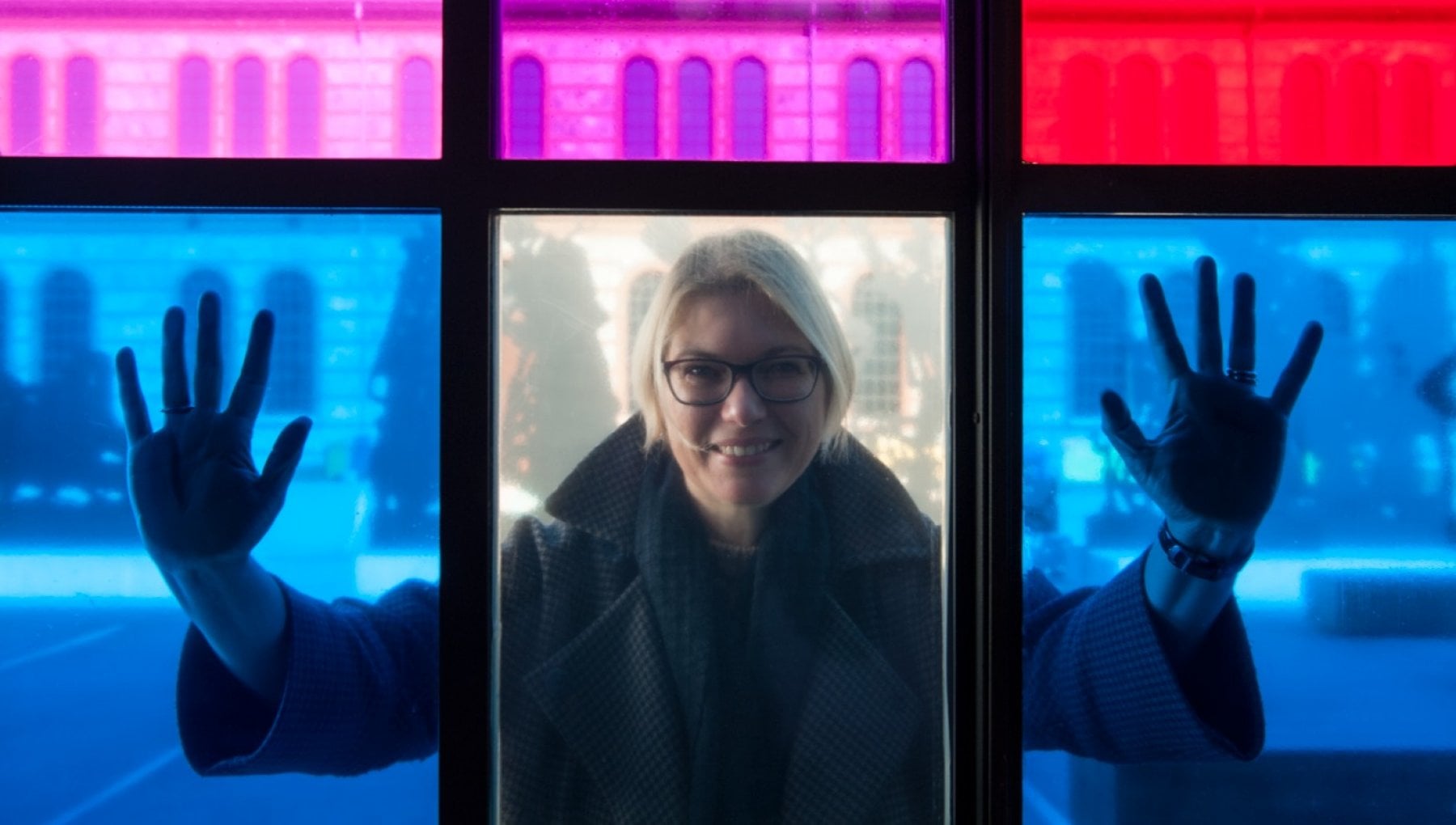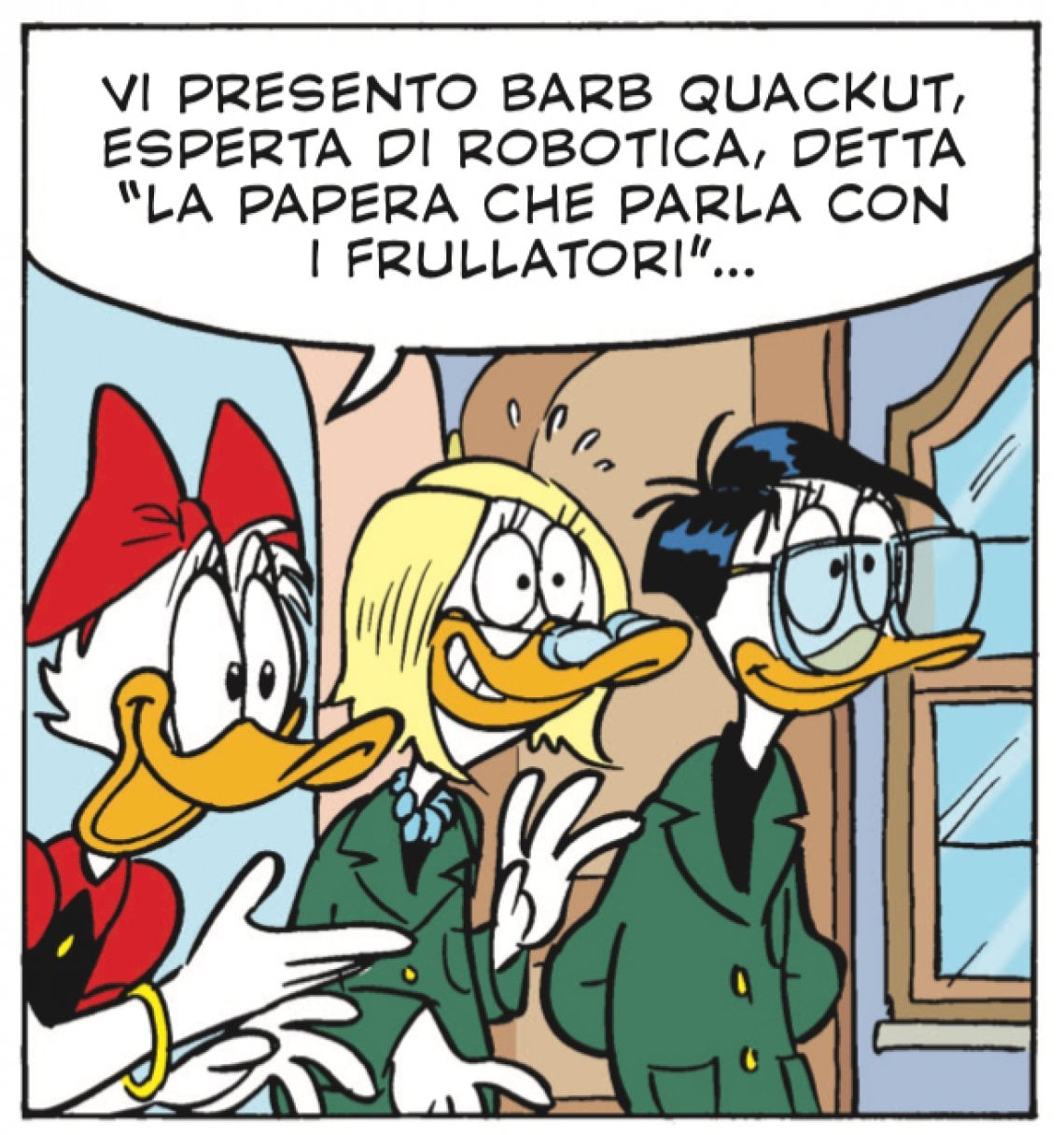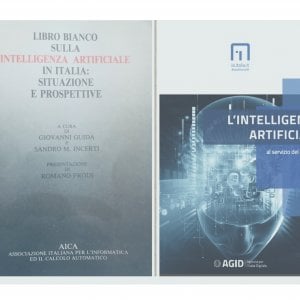
"Don't ask me if we should be afraid of robots, please." Barbara Caputo is Full Professor at the Polytechnic of Turin, where she directs the Hub AI @ PoliTo, as well as a fellow and member of the ELLIS board. He received his doctorate in computer science from the Royal Institute of Technology in Stockholm in 2005; today it mainly deals with the development of algorithms for the learning, recognition and cataloging of visual and multimodal patterns for autonomous artificial systems. But among the many titles she has, one is really curious: in a story published on Mickey Mouse in March 2020 she is called Barb Quackut and she is a scientist friend of Daisy Duck.
His comic alter ego talks to blenders, which in their own way are robots: but what is robotics and what does it do?
“By robotics we mean the science and technology that try to produce artificial systems capable of replicating human behavior, of moving and acting / interacting in space. If I consider only the output, a robot is all the more advanced the more difficult it is to deduce whether it is the work of a person or a machine ”.
So, however, we are already at the Turing test.
“Of course, the goal of robotics is to make machines that do what a human being is capable of”.

And so we're talking about artificial intelligence, aren't we?
“If the robot is the hardware, the artificial intelligence is the software, together they are, so to speak, action and thought aimed at replicating the action and thought of human beings. When it comes to thinking – something to be taken with a grain of salt – I often give the example of an artificial intelligence in charge of surveillance of a place through cameras. It is an intellectual activity, in the sense that you have to go through thousands of images and answer a simple question: is everything okay? Yes or no depends on a series of circumstances, which can be analyzed by a computer program. There is not much intelligence as we conceive it, but if a computer is able to perform this task in an optimal way, the result seems to be the result of the work of a human being, indeed of a human of which we would say that it is a intelligent person ".
Computers Learn: But Do They Always Need Humans To Teach It?
“Talking to the blender or Alexa, and saying they learn on their own are two sides of the same thing because learning on their own is the ability of an artificial agent to acquire associated data, which we technically call an annotation. We could call it experience: from the point of view of a machine it means that something is associated with something that gives it meaning, and for this you need a master. At this moment there is a great push to develop theories, algorithms, technologies capable of using the minimum possible data and doing without or almost without the master, because the annotation work is typically manual and expensive. The data, on the contrary, is more and more and more and more complex ".

But if a computer learns on its own, how do we make sure it learns the right things? And above all, how do we explain to an artificial intelligence that what it sees today, for example the inequality of economic treatment between men and women, is actually not our idea of a just society?
“I don't have the true answer, I just have fears and anxieties that I am aware of. When you enter this area you have to move with extreme caution because it is a very serious problem and not easy to solve. The first thing I feel like saying is that bias exists. From birth, all intelligent biological systems are constantly immersed in an avalanche of sensory stimuli: they do not learn all over again, but what we call mental models are created. For example, when I see a chair, I expect it to be used in a certain way, because I have in my head a model built on the basis of my experiences. In fact I don't think about it, I don't learn anymore: but this is prejudice, which is something very subtle because it is based on experience, and ours are inevitably limited and partial. The first step is to be aware that a prejudice exists, but even we as a society don't always manage to get there. One might wonder why we should ask ourselves such questions about artificial intelligence, if we ourselves are built to follow these patterns. I do not want to say that we have to resign ourselves, but we must bear in mind that there is no common agreement on a global level on what bias is. Bias is one of the many possible points of view and requires a lot of attention, but also tools that somehow allow us to recognize and overcome it. For the scientist Yann LeCun we are moving towards artificial intelligence systems that learn by themselves: but if something can be done, it does not necessarily have to be done. We need to watch out for the alarm raised by another scientist, Timnit Gebru, who explained how the Google Language Model, on which we do all our research, is now out of control. The mass of data it uses is huge and is constantly updating, so we are no longer able to tell what the algorithm is really learning ”.
Also for raising this alarm, Timnit Gebru was fired by Google , where she worked. But who should recognize and possibly correct the bias?
“I remember reading the data of a large insurance company on the rates of fraud in the various regions of Italy. One in particular, which I don't even want to mention, has a record of false claims. Now, an algorithm could dictate that when a refund request arrives from this particular region, the refund must be denied more often than elsewhere. However, an external regulation could impose that there are no geographical biases and therefore balance the algorithm's bias. It is a political gesture, not a technical one ”.
You were also on the Government Task Force for Artificial Intelligence, so the problem will be clear to you …
“I participated in various working groups, and in the last one, together with eight other colleagues, we helped the Government to define the national strategy on artificial intelligence. Officially our role has ended, but we are always ready to provide opinions and advice when we are questioned. I want to point out that among the actions envisaged by the Plan, those in support of gender equality are at the fore, to guarantee women's access to STEM disciplines and professions ".

In your experience, how much are women represented in the groups where you found yourself working?
"Too little. Artificial intelligence is one of the many technical-scientific disciplines in which at this historical moment there is too low a percentage of women, as well as African Americans, Africans, exponents of other cultures. Being aware of the problem solves it up to a certain point: academic systems such as Italian, French and Spanish are very different from those of central or northern Europe, and even acting in perfect good faith it is sometimes very difficult if not impossible to obtain. that the work or study groups are adequately representative ".
How many women attend your courses in Turin?
“In my class I would say between 10 and 20%, but in my group at the moment the perms are 100% women; next year a man will probably come in, and the percentage will drop. At doctoral level we are around 25% and for me it is an interesting number: in the groups where I have worked there have always been at least 10% more women. I pay more attention to women, but it is also true that I receive more applications from them, perhaps because those who are at the beginning of their career with a woman at the helm of the laboratory feel calmer. And men soon get used to working in an environment where there are women at all levels of responsibility: for me it is important, I find that there is great value in the quotas ".
More generally, how are we placed in Italy compared to the rest of the world, with regards to research on artificial intelligence?
“It is a vibrant community, well positioned internationally and growing. There are some centers of excellence, from Turin to Rome, which are working very well. And then now artificial intelligence attracts students, both for the suggestion and for the concrete possibilities it offers after the course of study: career, professional and even economic satisfactions. Objectively, for those who work in the sector it is possible to recruit talents of great value. That said, the system doesn't help ”.

In what sense?
“The minimum doctoral scholarship with us is 1000-1100 euros per month, while a private company quietly pays a salary of one and a half times in Italy, or two to three times higher abroad. It is difficult to keep children by focusing on the economic aspect, if we succeed it is because we offer them a quality experience. But I believe that if a country decides to build its ruling class – because this is what we are talking about – based on volunteers and personal generosity, it is not going anywhere. Italy is a country where it is very difficult to get across the idea that a PhD student in computer science can be paid more than one who studies other disciplines. It is one of the possible points of view, and I respect it as such, but for me it means that we are throwing in the towel in this sector ”.
Is anything changing with the PNNR and with Draghi?
" Many of my colleagues in the United States and in Europe have one foot in the academic world and one in the industrial world: at the beginning they were mostly IT companies, now the typology is wider. This is an aspect present in the National Plan for Artificial Intelligence, and I am very happy with it: Industry 4.0 wanted to update the fleet of Italian Industry, now it is time to update the fleet of people, because in the end people make things. I hope that MISE really pushes on collaboration between public and private and help to unlock a lot of energy, both from the academic world and from the business world. From an academic point of view, until a few months ago there was talk of an Italian institute of AI, i3A, with headquarters in Turin and hubs distributed throughout the country: in the Strategy it was decided instead to opt for a network with an innovation ecosystem using funds from the PNNR, where a research partnership is ca dedicated to artificial intelligence ".
In Turin there are many examples of collaboration between universities and large companies, however, starting with the one with Amazon, which has its artificial intelligence laboratory a few hundred meters from the Polytechnic.
"Not only that: there is the Intesa San Paolo group, from which great news will soon arrive, then the whole insurance world with Reale Mutua which is starting the transition to become a data driven company and looks to the academic world of Turin as a partner basic. And then Iveco, and many foreign companies that come to look for us, such as Sony. Since I have been working in Turin, my research is mainly funded by public-private agreements and this creates a very stimulating environment for the group because there is room for more speculative work, as well as for something very thorough, up to proof. of concept but also further on. And this is truly a great wealth in a field like artificial intelligence ”.

What do you want to happen and what do you fear will happen in 2022?
“The legislation has started and the first concrete measures will be seen in the first half of 2022. For the rest, I would like Italy to have a more assertive role on artificial intelligence at all levels, both at the European table where the legislation will be discussed, and in the choices regarding defense, the army, and security issues. national and territorial control. And in general, in everything related to artificial intelligence, a huge driving force of the digital transition. But we must also be assertive in educating and informing citizens responsibly. I wish there was a greater awareness that artificial intelligence is not just a passing fad, because artificial intelligence means automating the analysis of the data we produce, just like robots have automated work in the production chain. The danger is that Italy will end up buying artificial intelligence from someone else, without understanding it and without controlling it: all the data of the Italian public administration will be managed and analyzed by algorithms created by other countries, perhaps not in Europe. So I would like this awareness to mature, to be able to go beyond what will happen in five minutes. Because others will no longer talk about AI, and not because it will have gone out of fashion: because it will be like asking someone if they use a computer for work. This is what I would like for my country, it is both my hope and my fear ”.

